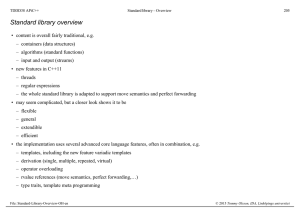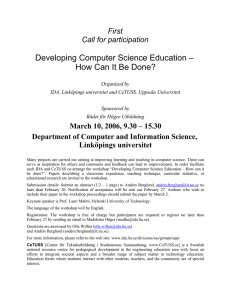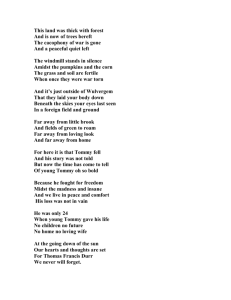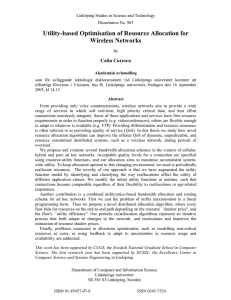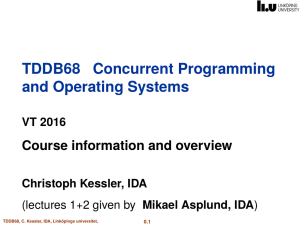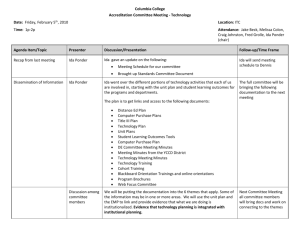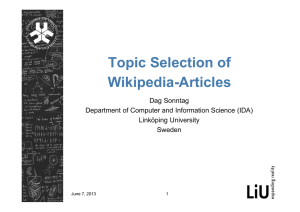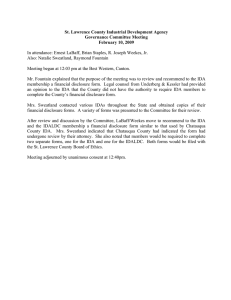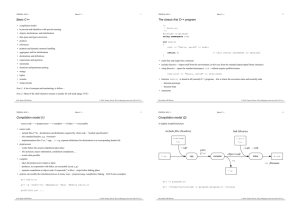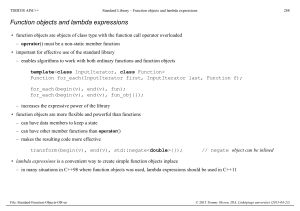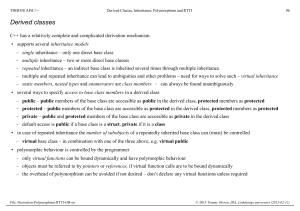TDDD38 Advanced Programming in C++ Organization
advertisement
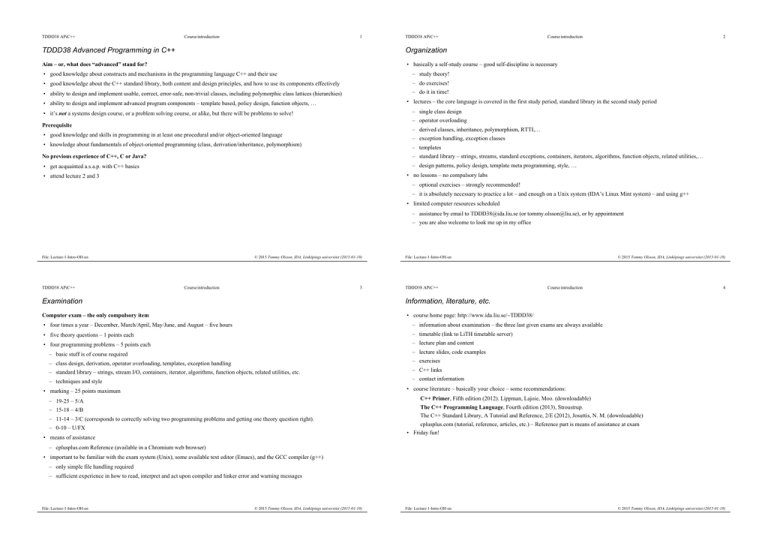
TDDD38 APiC++
Course introduction
1
TDDD38 APiC++
Course introduction
TDDD38 Advanced Programming in C++
Organization
Aim – or, what does “advanced” stand for?
• basically a self-study course – good self-discipline is necessary
• good knowledge about constructs and mechanisms in the programming language C++ and their use
– study theory!
• good knowledge about the C++ standard library, both content and design principles, and how to use its components effectively
– do exercises!
2
– do it in time!
• ability to design and implement usable, correct, error-safe, non-trivial classes, including polymorphic class lattices (hierarchies)
• lectures – the core language is covered in the first study period, standard library in the second study period
• ability to design and implement advanced program components – template based, policy design, function objects, …
– single class design
• it’s not a systems design course, or a problem solving course, or alike, but there will be problems to solve!
– operator overloading
Prerequisite
– derived classes, inheritance, polymorphism, RTTI,…
• good knowledge and skills in programming in at least one procedural and/or object-oriented language
– exception handling, exception classes
• knowledge about fundamentals of object-oriented programming (class, derivation/inheritance, polymorphism)
– templates
No previous experience of C++, C or Java?
– standard library – strings, streams, standard exceptions, containers, iterators, algorithms, function objects, related utilities,…
– design patterns, policy design, template meta programming, style, …
• get acquainted a.s.a.p. with C++ basics
• no lessons – no compulsory labs
• attend lecture 2 and 3
– optional exercises – strongly recommended!
– it is absolutely necessary to practice a lot – and enough on a Unix system (IDA’s Linux Mint system) – and using g++
• limited computer resources scheduled
– assistance by email to TDDD38@ida.liu.se (or tommy.olsson@liu.se), or by appointment
– you are also welcome to look me up in my office
File: Lecture-1-Intro-OH-en
TDDD38 APiC++
© 2015 Tommy Olsson, IDA, Linköpings universitet (2015-01-19)
Course introduction
3
File: Lecture-1-Intro-OH-en
TDDD38 APiC++
Examination
Information, literature, etc.
Computer exam – the only compulsory item
• course home page: http://www.ida.liu.se/~TDDD38/
© 2015 Tommy Olsson, IDA, Linköpings universitet (2015-01-19)
Course introduction
• four times a year – December, March/April, May/June, and August – five hours
– information about examination – the three last given exams are always available
• five theory questions – 1 points each
– timetable (link to LiTH timetable server)
• four programming problems – 5 points each
– lecture plan and content
– basic stuff is of course required
– lecture slides, code examples
– class design, derivation, operator overloading, templates, exception handling
– exercises
– standard library – strings, stream I/O, containers, iterator, algorithms, function objects, related utilities, etc.
– C++ links
4
– contact information
– techniques and style
• course literature – basically your choice – some recommendations:
• marking – 25 points maximum
– 19-25 – 5/A
– 15-18 – 4/B
– 11-14 – 3/C (corresponds to correctly solving two programming problems and getting one theory question right).
– 0-10 – U/FX
• means of assistance
C++ Primer, Fifth edition (2012). Lippman, Lajoie, Moo. (downloadable)
The C++ Programming Language, Fourth edition (2013), Stroustrup.
The C++ Standard Library, A Tutorial and Reference, 2/E (2012), Josuttis, N. M. (downloadable)
cplusplus.com (tutorial, reference, articles, etc.) – Reference part is means of assistance at exam
• Friday fun!
– cplusplus.com Reference (available in a Chromium web browser)
• important to be familiar with the exam system (Unix), some available text editor (Emacs), and the GCC compiler (g++)
– only simple file handling required
– sufficient experience in how to read, interpret and act upon compiler and linker error and warning messages
File: Lecture-1-Intro-OH-en
© 2015 Tommy Olsson, IDA, Linköpings universitet (2015-01-19)
File: Lecture-1-Intro-OH-en
© 2015 Tommy Olsson, IDA, Linköpings universitet (2015-01-19)
TDDD38 APiC++
Course introduction
5
TDDD38 APiC++
Course introduction
Lecture plan for the forthcoming lectures
C++ history and future
Lecture 2-3
• one of the most popular programming languages
• basic stuff – data types, variables and constants, declarations, expressions and operators, statements, functions,…
• development started in 1979 – originally named C with Classes
• strings, initializer lists, tuples, streams, string streams
• renamed C++ in 1983
Lecture 4–5
• C++98 – the first ISO standard
• single class design and operator overloading
• C++03 – C++98 was amended by the 2003 technical corrigendum (TC)
6
• C++11 – current standard (formerly known as C++0x, since it was expected to be released before 2010)
Lecture 6–7
– a “new” C++
• derived classes, inheritance, polymorphism, RTTI
– a new C++ programming style is developing
• exception handling
• C++14 – minor revision targeted for late 2014, but delayed
Lecture 8-9
– mainly bug fixes and small improvements
• templates
– one new major feature can be expected – maybe static if (compile time if statement)
• namespaces
• C++1y – major revision targeted for 2017
• preprocessor
– will not be the last…
Lecture 10-12 (13)
• Each revision
• standard library
– adds more power
– containers – iterators – algorithms – function objects, lambda expression
– makes constructs more general
– related utilities and such (e.g. std::pair)
– increases efficiency even more
– maybe some more…
– makes C++ easier to use
And now some comments to the course content…
File: Lecture-1-Intro-OH-en
TDDD38 APiC++
© 2015 Tommy Olsson, IDA, Linköpings universitet (2015-01-19)
Course introduction
7
Object-oriented programming
File: Lecture-1-Intro-OH-en
© 2015 Tommy Olsson, IDA, Linköpings universitet (2015-01-19)
TDDD38 APiC++
Course introduction
8
Important characteristics for class types in C++
Three main components – objects, inheritance, polymorphism
{
string s1;
• objects
// an object declaration, in some block, string is a class type
}
– classes are used to model objects
• classes in C++ are not reference types
– in C++ we have two syntactic choices, class or struct
– only difference is related to default member and base member access – private for class – public for struct
– s1 stores an object of type string – it’s not a reference to such an object
– rule of thumb: use struct for behaviourless aggregates with public members only, class otherwise
– a string object is automatically created and initialized when the declaration of s1 is elaborated
– when the execution exits the declaration block, s1 goes out of scope – the object is destroyed – memory is reclaimed
• inheritance
• class types have the same basic semantics as fundamental types, e.g.
– code can be reused by derivation, base class – subclass
– creates related classes/objects – a subclass object is also a base class object regarding type, an “is a” relationship
– require copy semantics not found in most other object-oriented languages – in C++11 move semantics is also available
– derivation is typically a question of specialization – a subclass can have more state and more functionality
– C++ supports four ways to derive from a base class – public base, protected base, private base, and virtual base
string s2{s1};
s2 = s1;
// initialization
// assignment
string s2(s1);
string s2 = s1;
• polymorphic behaviour
– an object reference (pointer or reference) may at different times refer to objects of different type
– the same member function call may at different times give different result, depending on the type of the related object
– initialization – default constructor, argument passing constructors
– copying – copy constructor, copy assignment operator, move constructor, move assignment operator
• polymorphic behaviour is optional in C++
– destruction – destructor
– a member functions must be declared virtual to be able to behave polymorphic
• to mimic e.g. Java we use pointers an dynamic memory allocation (memory has to be deallocated explicitly when no longer needed)
– objects must be referred to by pointers or references
• dynamic type checking and dynamic type conversion, RTTI
string* message{ new string{ "Hello world!"} };
…
delete message;
– sometimes it’s required
File: Lecture-1-Intro-OH-en
• great care must be taken when designing classes in C++
© 2015 Tommy Olsson, IDA, Linköpings universitet (2015-01-19)
File: Lecture-1-Intro-OH-en
© 2015 Tommy Olsson, IDA, Linköpings universitet (2015-01-19)
TDDD38 APiC++
Course introduction
9
Inheritance and classes derivation
TDDD38 APiC++
Course introduction
10
Operator overloading
• class derivation is an essential features of object-oriented design
ostream& operator<<(ostream& os, const T& x)
{
// write x to os
return os;
}
– new classes can be defined from exciting classes
– code is reused – members are inherited
• C++ supports “all” variants
– single inheritance (single base class)
• important for construction of fully featured data types
– multiple inheritance (multiple base classes), which can lead to
– assignment
– repeated inheritance (DDD – the Deadly Diamond of Derivation, ♦), which is supported by
– indexing
– virtual inheritance (virtual base class) – how many Base subobjects are there to be in Most_Derived?
– any other operator for which there is a natural interpretation of its use
• function objects rely on the possibility to overload the function call operator – operator()
Base
Base_1
member
Base_2
member
Base
member
– function objects are important components in the standard library – lambda expressions are implemented as function objects
member
– can act as function
– can carry state
– possible to overload for class types and for compound types (enum types, pointer types, etc.)
Derived_1
Derived_2
Derived
Derived_1
♦
Derived_2
struct fun
{
void operator()() const { cout << "This is fun!\n"; }
};
Most_Derived
fun()();
File: Lecture-1-Intro-OH-en
TDDD38 APiC++
© 2015 Tommy Olsson, IDA, Linköpings universitet (2015-01-19)
Course introduction
11
// not the same parentheses…
File: Lecture-1-Intro-OH-en
TDDD38 APiC++
© 2015 Tommy Olsson, IDA, Linköpings universitet (2015-01-19)
Course introduction
Templates
Exception handling
Extremely powerful construct in C++.
• conceptually fairly simple, but should be used with care.
• for creating reusable program components – function templates and class templates
fun{}()
12
– prefer traditional, local error handling if possible
– good for reporting errors from within software components
template <typename T> T fun(const T& a);
– place error handlers with care – avoid “exception handling spaghetti”
– practice exception-safe (error-safe) programming
template <typename T, size_t N> class array;
• C++ implements the termination model – the alternative to the resumption model
• supports e.g. policy design
– a policy used by a type (class) can be separated into one or more policy classes, which can be supplied as a template parameter
template <typename T, class Allocator = allocator<T>> class vector;
– at least one block is terminated
– exceptions are propagated backwards along the dynamic call chain
– stack objects will be destroyed implicitly and properly when blocks are exited
– heap objects must be taken responsibility for by the programmer (smart pointers is one possibility)
• supports template metaprogramming
try
{
– function templates can be used to let the compiler generate source code
– recursive, purely static template functions can perform compile-time evaluation
...
if (disaster) throw some_exception{"help!"};
...
• is an object-oriented construct – static (compile-time) polymorphism
– a function template represents a whole family of functions
– a class template represents a whole family of classes, data types are pure static (compile-time) constructs
• the standard library depend heavily on templates, in many cases in combination with derivation
– the new feature variadic templates is widely used in the implementation of the standard library
}
catch (const exception& e)
{
cout << e.what() << endl;
}
// supposed subclass to std::exception
// “polymorphic catch”
template <typename... Types> class tuple;
File: Lecture-1-Intro-OH-en
© 2015 Tommy Olsson, IDA, Linköpings universitet (2015-01-19)
File: Lecture-1-Intro-OH-en
© 2015 Tommy Olsson, IDA, Linköpings universitet (2015-01-19)
TDDD38 APiC++
Course introduction
13
TDDD38 APiC++
Namespaces
Standard Library
A simple module construct.
Data structure and algorithm part
Course introduction
14
• the class has module properties, but it’s not enough
Streams
– was one of the last things introduced before the first standard C++98 was published
• important in several aspects
– for handling potential name collisions
– modularisation – a type and it’s operations, e.g., should be encapsulated in the same namespace
Containers
– function name look up – ADL look up (argument-dependent look up) – is related to namespaces
namespace std
{
// namespace member declarations…
}
Iterators
Algorithms
Function
objects
using namespace std;
// using directive
• String
using std::member;
// using declaration
• Streams
... std::member ...
// qualified name
• String streams
• Related utilities
• Interesting implementation, e.g.
– templates
– derivation
– policy design
File: Lecture-1-Intro-OH-en
TDDD38 APiC++
© 2015 Tommy Olsson, IDA, Linköpings universitet (2015-01-19)
Course introduction
15
And, of course, a lot of basic stuff to be mastered
The “C part”.
• Lexical conventions
• Translation model – compilation and linking
• Data types and type conversion
• Declarations and definitions
• Expression and operators
• Statements
• Functions and parameter passing
• Basic standard library components
• I/O and file handling
Topics for lecture 2 and 3.
File: Lecture-1-Intro-OH-en
© 2015 Tommy Olsson, IDA, Linköpings universitet (2015-01-19)
File: Lecture-1-Intro-OH-en
© 2015 Tommy Olsson, IDA, Linköpings universitet (2015-01-19)
